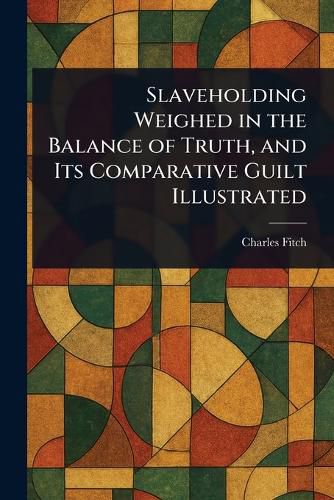Readings Newsletter
Become a Readings Member to make your shopping experience even easier.
Sign in or sign up for free!
You’re not far away from qualifying for FREE standard shipping within Australia
You’ve qualified for FREE standard shipping within Australia
The cart is loading…






This title is printed to order. This book may have been self-published. If so, we cannot guarantee the quality of the content. In the main most books will have gone through the editing process however some may not. We therefore suggest that you be aware of this before ordering this book. If in doubt check either the author or publisher’s details as we are unable to accept any returns unless they are faulty. Please contact us if you have any questions.
"Slaveholding: Weighed in the Balance of Truth" by Charles Fitch offers a powerful examination of slavery in the United States. This important historical work, meticulously prepared for print republication, delves into the ethics and moral implications of slavery during a pivotal period leading up to the Civil War.
Fitch confronts the institution of slavery head-on, exploring its impact on American society and the enduring quest for abolition. By weighing slavery against a standard of truth, the author provides a stark commentary on the era. This book serves as a valuable resource for understanding the complex social and political landscape of the United States and the ongoing struggle for equality. It remains a relevant exploration of a dark chapter in American history, prompting reflection on enduring questions of justice and human rights. A vital text for anyone interested in the history of slavery, the Civil War period, and the evolution of ethical thought.
This work has been selected by scholars as being culturally important, and is part of the knowledge base of civilization as we know it.
This work is in the public domain in the United States of America, and possibly other nations. Within the United States, you may freely copy and distribute this work, as no entity (individual or corporate) has a copyright on the body of the work.
Scholars believe, and we concur, that this work is important enough to be preserved, reproduced, and made generally available to the public. We appreciate your support of the preservation process, and thank you for being an important part of keeping this knowledge alive and relevant.
$9.00 standard shipping within Australia
FREE standard shipping within Australia for orders over $100.00
Express & International shipping calculated at checkout
This title is printed to order. This book may have been self-published. If so, we cannot guarantee the quality of the content. In the main most books will have gone through the editing process however some may not. We therefore suggest that you be aware of this before ordering this book. If in doubt check either the author or publisher’s details as we are unable to accept any returns unless they are faulty. Please contact us if you have any questions.
"Slaveholding: Weighed in the Balance of Truth" by Charles Fitch offers a powerful examination of slavery in the United States. This important historical work, meticulously prepared for print republication, delves into the ethics and moral implications of slavery during a pivotal period leading up to the Civil War.
Fitch confronts the institution of slavery head-on, exploring its impact on American society and the enduring quest for abolition. By weighing slavery against a standard of truth, the author provides a stark commentary on the era. This book serves as a valuable resource for understanding the complex social and political landscape of the United States and the ongoing struggle for equality. It remains a relevant exploration of a dark chapter in American history, prompting reflection on enduring questions of justice and human rights. A vital text for anyone interested in the history of slavery, the Civil War period, and the evolution of ethical thought.
This work has been selected by scholars as being culturally important, and is part of the knowledge base of civilization as we know it.
This work is in the public domain in the United States of America, and possibly other nations. Within the United States, you may freely copy and distribute this work, as no entity (individual or corporate) has a copyright on the body of the work.
Scholars believe, and we concur, that this work is important enough to be preserved, reproduced, and made generally available to the public. We appreciate your support of the preservation process, and thank you for being an important part of keeping this knowledge alive and relevant.